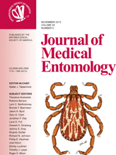
JOURNAL OF MEDICAL ENTOMOLOGY
Scope & Guideline
Pioneering insights into the world of medical entomology.
Introduction
Aims and Scopes
- Vector Ecology and Behavior:
Research on the ecology and behavior of vectors such as mosquitoes, ticks, and sand flies, including their life cycles, host interactions, and feeding behaviors. - Insecticide Resistance and Management:
Studies investigating the mechanisms of insecticide resistance in vector populations and the development of innovative control strategies, including the use of biological control agents and novel formulations. - Surveillance and Epidemiology:
Public health-focused surveillance studies aimed at understanding the distribution and incidence of vector-borne diseases, including the identification of pathogens in vector populations. - Molecular and Genetic Studies:
Research utilizing molecular techniques to study genetic diversity, population structure, and phylogenetics of vectors and their associated pathogens. - Impact of Climate Change:
Investigations into how climate change affects the distribution, abundance, and behavior of vectors, as well as the implications for disease transmission. - Public Engagement and Citizen Science:
Exploration of community involvement in vector surveillance and control efforts, including the efficacy of citizen science projects.
Trending and Emerging
- Integrated Vector Management (IVM):
There is a growing emphasis on integrated approaches that combine biological, chemical, and environmental strategies for sustainable vector management, reflecting a trend towards holistic public health solutions. - Molecular Techniques in Surveillance:
The application of molecular techniques for pathogen detection and vector identification is on the rise, enhancing surveillance capabilities and improving the understanding of vector-borne disease epidemiology. - Climate-Driven Studies:
Research examining the impacts of climate variability on vector populations and disease transmission dynamics is increasingly common, highlighting the need to adapt public health strategies to changing environmental conditions. - Community-Based Research:
Emerging interest in community engagement and citizen science initiatives to enhance vector surveillance and control efforts, recognizing the importance of public involvement in disease prevention. - Resistance Mechanisms and Alternatives:
Research into the mechanisms of insecticide resistance and the development of alternative control strategies, including genetic and biological control methods, is gaining traction in response to the growing resistance crisis.
Declining or Waning
- Traditional Vector Control Methods:
There is a noticeable decline in studies focused solely on traditional chemical control methods, likely due to increasing resistance issues and a shift towards integrated pest management approaches. - Basic Descriptive Taxonomy:
Research articles that primarily focus on basic taxonomic descriptions of new species without linking to broader ecological or epidemiological implications have become less prevalent. - Static Spatial Distribution Studies:
Studies that provide static assessments of vector distributions without considering dynamic environmental factors or changes over time are less common, as researchers now emphasize more adaptive and predictive modeling approaches. - Single-Pathogen Studies:
Research focusing on the interactions of a single pathogen with its vector is waning, with a shift towards multi-pathogen interactions and co-infections that can better inform public health strategies.
Similar Journals
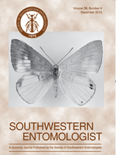
SOUTHWESTERN ENTOMOLOGIST
Unveiling Insights for Sustainable Agricultural PracticesSOUTHWESTERN ENTOMOLOGIST is a pivotal academic journal dedicated to advancing the fields of Agronomy, Ecology, and Insect Science. Published by the SOUTHWESTERN ENTOMOLOGICAL SOC in the United States, this journal plays a crucial role in disseminating vital research findings that address pressing ecological and agricultural challenges. With its ISSN 0147-1724 and E-ISSN 2162-2647, the journal has been publishing comprehensive studies since 1993 and continues to contribute significantly to the knowledge base up to 2024. As a Q4 ranked journal in both Agronomy and Crop Science and Ecology, as well as Insect Science, it provides an inclusive platform for researchers and students to share their insights and foster collaborations. Although it currently does not offer open access options, the content is accessible to academic institutions and professionals, ensuring that significant findings reach a broad audience. Given its niche focus, SOUTHWESTERN ENTOMOLOGIST not only appeals to researchers and students but also to professionals looking to stay updated on the latest trends and developments in entomology and its related fields.
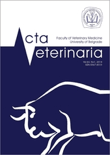
ACTA VETERINARIA-BEOGRAD
Exploring the frontiers of veterinary science.ACTA VETERINARIA-BEOGRAD is a distinguished academic journal dedicated to the field of veterinary science, focusing on a broad spectrum of topics pertinent to veterinary medicine and animal health. Published by SCIENDO, this journal has been an open-access resource since 2014, facilitating the dissemination of valuable research findings and innovations to a global audience. With an ISSN of 0567-8315 and an E-ISSN of 1820-7448, it plays a critical role in promoting accessible knowledge in veterinary practices while contributing to the advancement of the field. Located in Poland, this journal notably ranks in the Q3 quartile for veterinary studies, reflecting its ongoing commitment to quality and relevance. The journal welcomes contributions from a diverse range of veterinary disciplines, making it a vital platform for researchers, practitioners, and students alike who aspire to advance their understanding and impact within the veterinary community.

Current Research in Parasitology & Vector-Borne Diseases
Bridging gaps between science and public health in parasitology.Current Research in Parasitology & Vector-Borne Diseases, published by ELSEVIER, is an influential journal dedicated to advancing the understanding of parasitology and vector-borne diseases. With an ISSN of 2667-114X, this journal is highly esteemed in the field, holding a prestigious Q1 quartile ranking in categories such as Animal Science and Zoology, Insect Science, and Parasitology, as well as a notable Q2 ranking in Virology for 2023. The journal's focus spans a crucial intersection of disciplines, offering a platform for innovative research that directly addresses global health challenges posed by parasites and vectors. Researchers benefit from its robust open-access model, which facilitates unrestricted dissemination of knowledge, making essential findings accessible to a wider audience. The journal continues to play a pivotal role in fostering scholarly dialogue and interdisciplinary collaboration within the scientific community, serving as a vital resource for professionals, students, and academicians interested in the dynamic and evolving field of parasitology.

JOURNAL OF THE AMERICAN MOSQUITO CONTROL ASSOCIATION
Elevating standards in mosquito population management.JOURNAL OF THE AMERICAN MOSQUITO CONTROL ASSOCIATION is a premier journal dedicated to advancing the study and management of mosquito populations, critical for public health and environmental sustainability. Published by the American Mosquito Control Association, this journal boasts a robust interdisciplinary platform, encompassing essential research in Ecology, Insect Science, and Public Health, as evidenced by its placement in the Q2 and Q3 quartiles in these pivotal categories. Since its inception in 1985, the journal has provided valuable insights and methodologies related to mosquito control, vital for researchers and practitioners in the field. While it is not an open-access journal, its rigorous peer-review process ensures high-quality publications that significantly contribute to the ongoing discourse surrounding mosquito behavior, ecology, and management strategies. As the fight against vector-borne diseases continues, this journal serves as an indispensable resource for professionals and scholars aiming to develop innovative solutions to these pressing health challenges.
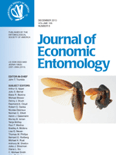
JOURNAL OF ECONOMIC ENTOMOLOGY
Fostering Interdisciplinary Dialogue on Insect ImpactJOURNAL OF ECONOMIC ENTOMOLOGY, published by OXFORD UNIV PRESS INC, stands as a premier interdisciplinary platform for researchers and professionals in the realms of entomology and ecological sciences. With a robust publication history dating back to 1945, this esteemed journal has consistently maintained its reputation for disseminating high-quality research, as evidenced by its prestigious Q1 rankings in both Ecology and Insect Science for 2023. The journal’s impact is highlighted by its excellent Scopus ranks, placing it in the top percentile of Agricultural and Biological Sciences and Environmental Science categories. Aimed at advancing the understanding of insects and their relationships with humans and ecosystems, the JOURNAL OF ECONOMIC ENTOMOLOGY offers a critical forum for original research articles, reviews, and opinion pieces that influence practices in pest management, conservation, and agricultural productivity. Although not an Open Access journal, its findings are pivotal for students, researchers, and professionals striving to address contemporary challenges in entomology and beyond.
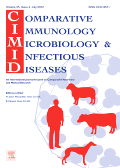
COMPARATIVE IMMUNOLOGY MICROBIOLOGY AND INFECTIOUS DISEASES
Pioneering Discoveries in Infectious Disease ResearchComparative Immunology Microbiology and Infectious Diseases, published by Elsevier Science Ltd, is a prominent journal dedicated to advancing the fields of immunology, microbiology, infectious diseases, and veterinary sciences. Established in 1978, this journal has become a vital resource for researchers and professionals alike, with a commendable impact factor that reflects its significance in academia. The journal, available in both print and electronic formats (ISSN: 0147-9571, E-ISSN: 1878-1667), stands out for its commitment to disseminating innovative research findings, particularly through its categorization in Q2 and Q3 quartiles across various related disciplines as of 2023. The journal aims to provide insightful comparative analyses that enhance our understanding of host-pathogen interactions, immune responses, and disease manifestations. With a global readership base, it serves as a platform for collaborative discourse among scientists and professionals, ultimately contributing to the improvement of health outcomes worldwide.

BULLETIN OF INSECTOLOGY
Pioneering Discoveries in Insect ResearchBULLETIN OF INSECTOLOGY is a prominent academic journal published by ALMA MATER STUDIORUM, UNIV BOLOGNA, Italy, specializing in the field of Insect Science. The journal, with ISSN 1721-8861 and E-ISSN 2283-0332, has established itself as a vital resource for researchers and professionals interested in the diverse aspects of entomology and its applications. It ranks in the Q2 category for Insect Science as of 2023, placing it among the top journals in its field with a Scopus rank of 79 out of 181. The BULLETIN OF INSECTOLOGY is committed to disseminating high-quality research and innovative studies, facilitating open dialogue and collaboration among scientists. As an essential platform for sharing groundbreaking findings, it contributes significantly to the body of knowledge in agricultural and biological sciences, making it an invaluable asset for scholars and practitioners alike. With coverage from 2002 to 2024, this journal continues to foster advancements in entomological research and its importance in tackling environmental challenges.
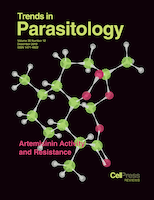
TRENDS IN PARASITOLOGY
Unveiling the complexities of host-parasite interactions.TRENDS IN PARASITOLOGY is a premier academic journal published by CELL PRESS, focusing on the dynamic field of parasitology and infectious diseases. With an ISSN of 1471-4922, this esteemed journal is recognized for its high impact within the research community, boasting a Q1 ranking in both the Infectious Diseases and Parasitology categories as of 2023. This places it among the top-tier journals in the field, as evidenced by its remarkable Scopus rankings, where it ranks #3 out of 79 in Parasitology and #29 out of 344 in Infectious Diseases. Spanning over two decades of scholarly contributions from 2001 to 2024, TRENDS IN PARASITOLOGY emphasizes the latest advancements, challenges, and innovative methodologies in parasitology, making it an invaluable resource for researchers, healthcare professionals, and students alike. With an increasing focus on open access initiatives, this journal not only promotes widespread dissemination of knowledge but also encourages collaboration across the global scientific community. Whether you are investigating novel interventions, exploring parasite evolution, or understanding host-pathogen interactions, TRENDS IN PARASITOLOGY remains at the forefront of research, driving forward the understanding of parasitic diseases.

KOREAN JOURNAL OF PARASITOLOGY
Illuminating the World of Parasites and Their ImpactKorean Journal of Parasitology is a respected publication in the field of parasitology, originating from the esteemed Korean Society of Parasitology and affiliated with Seoul National University College of Medicine. Established in 1977, this journal focuses on disseminating significant research findings related to parasitic diseases, their vectors, and control measures, serving as a vital resource for researchers, medical professionals, and students alike. Although coverage in Scopus has been discontinued as of 2022, the journal remains a valuable platform for in-depth studies within the areas of Infectious Diseases and Immunology. With an ISSN of 0023-4001 and an E-ISSN of 1738-0006, the journal promotes open access to enhance academic sharing. Despite its current Scopus rankings, which place it in the 38th percentile for Infectious Diseases and 37th percentile for Immunology and Microbiology (Parasitology), it continues to contribute to the global discourse on parasitological research, encouraging collaboration and emphasizing the importance of this field in public health.
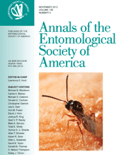
ANNALS OF THE ENTOMOLOGICAL SOCIETY OF AMERICA
Unveiling Nature's Secrets Through EntomologyANNALS OF THE ENTOMOLOGICAL SOCIETY OF AMERICA is a premier journal dedicated to advancing the field of insect science, published by Oxford University Press. With an impressive impact factor and classified in the Q1 quartile for its category, this journal ranks among the top publications in agricultural and biological sciences, specifically within insect science, positioned at #28 out of 181, indicating its significant influence and high-quality research contributions. The journal aims to disseminate original research, comprehensive reviews, and groundbreaking findings that enhance our understanding of entomology, spanning across ecological, evolutionary, and applied segments. With a consistent publication history since 1938, researchers, professionals, and students will benefit from the wealth of knowledge presented in its pages. Although the journal does not currently offer open access, it remains a vital resource for those seeking to stay at the forefront of entomological research and innovation.